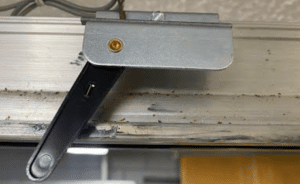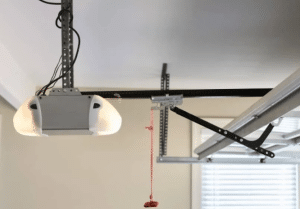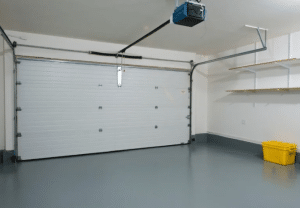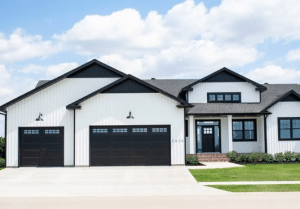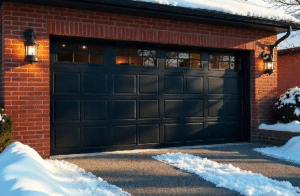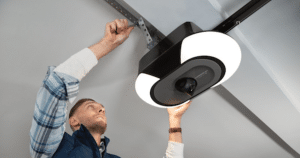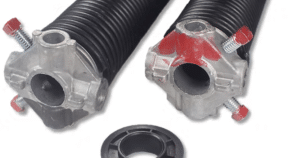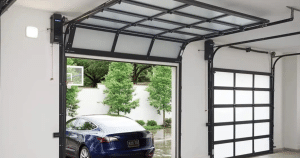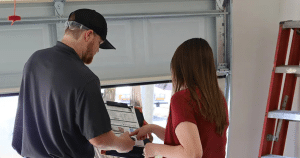Thinking about replacing your garage door but unsure if it’s time? Wondering, “How many years does a garage door last?” Find out what affects its lifespan before you invest in a new one.
Garage doors are essential to your home’s functionality, security, and curb appeal. Yet, many homeowners overlook their garage door until it fails. A common question arises, “How many years does a garage door last?” The answer isn’t as straightforward as you might think.
Like any mechanical system, a garage door has a limited lifespan influenced by several factors, including usage, maintenance, quality, and environmental exposure. Whether you’re dealing with odd noises, inconsistent movement, or cosmetic wear, understanding the average lifespan helps you make informed decisions about repair or replacement.
Knowing how many years a garage door lasts isn’t just helpful for budgeting future upgrades. It also plays a critical role in home safety and efficiency. Let’s explore what impacts garage door longevity and when you should start considering a replacement.
Average Lifespan: How Many Years Does a Garage Door Last?
Most residential garage doors last between 15 to 30 years. However, this range can vary significantly depending on usage patterns and care. If you’re asking, “How many years does a garage door last?” the short answer is: it depends.
Several key factors contribute to how long your garage door will last before needing major repairs or replacement:
Several key factors contribute to how long your garage door will last before needing major repairs or replacement:
1. Material Composition
The type of material your garage door is made from plays a major role in its durability:
- Steel doors are popular for their strength and longevity, but if not properly treated, they may be prone to rust in humid or coastal areas.
- Wood offers a classic look but generally requires more upkeep and may degrade faster in wet climates.
- Aluminum is lightweight and resistant to rust, but can be more easily dented.
- Fiberglass is resistant to salt-air corrosion and denting, but can become brittle with age or in extreme cold.

2. Maintenance and Upkeep
Routine maintenance can significantly extend a garage door’s usable life. Tasks such as lubricating moving parts, inspecting and tightening hardware, cleaning tracks, and checking the balance and alignment should be performed regularly. Ignoring maintenance can lead to early wear and tear, especially on components like springs, rollers, and cables.
3. Frequency of Use
Garage doors are built to open and close a finite number of cycles (one cycle = one open and one close). Most residential garage doors are rated for around 10,000 to 20,000 cycles. If you use your garage door multiple times a day — say, opening and closing it 6–8 times daily — it will wear out faster than a door used only once or twice a day.
4. Climate and Environmental Exposure
Weather plays a big role in a garage door’s lifespan. Exposure to extreme temperatures, high humidity, direct sunlight, snow, ice, and salty air (in coastal areas) can accelerate deterioration. Wooden doors may warp or rot, metal parts may corrode, and plastic components may crack over time if not properly protected.
5. Quality of Installation
A properly installed garage door operates more smoothly and tends to last longer. Professional installers ensure all components are calibrated correctly, minimizing stress on the opener and door tracks. Poor installation can lead to premature wear or mechanical failure.
A professional inspection is recommended if your door is approaching the 15-year mark and showing signs of wear or operational issues.
How Garage Door Parts Affect Lifespan
Garage doors are made up of several moving parts, and each has its own life expectancy. Understanding this can help you gauge the overall condition of your system.
Torsion and Extension Springs
Garage door springs are often the first component to fail. Most are rated for about 10,000 cycles (one cycle = one open and close). For a typical family, this could mean replacement every 7 to 10 years.
Garage Door Opener
Openers tend to last 10 to 15 years, depending on the quality of the unit and how well it’s maintained. If your opener struggles or operates inconsistently, it might be time for an upgrade.
Panels and Tracks
Damage from accidents or weather exposure can shorten the lifespan of panels and tracks. Regular cleaning and rust prevention can extend their usefulness.
Signs Your Garage Door Is Reaching the End of Its Life
Wondering if it’s time to replace your garage door? Here are clear indicators that yours may be on its last legs:
1. Frequent Breakdowns or Service Calls
Calling a technician every few months, or even more frequently, is a sign that your garage door system is no longer reliable. While occasional repairs are normal, an increasing need for professional service often points to widespread wear and aging components failing in a domino effect.
2. Slow or Jerky Operation
A well-functioning garage door should move smoothly and consistently. If your door opens or closes noticeably slower than it used to, or moves in a jerky or uneven motion, the issue could stem from worn-out rollers, a failing motor, or structural problems. This gradual deterioration usually indicates the system is reaching the end of its lifespan.
3. Sagging or Misaligned Panels
Over time, garage door panels can begin to sag or come out of alignment, especially in wood doors exposed to moisture or heavy use. Misalignment can interfere with the door’s ability to seal properly, making it harder to open or close and reducing your home’s energy efficiency. Sagging panels are often beyond repair and may require a full replacement.
4. Excessive Noise During Operation
Garage doors will always make some noise, but if your door suddenly becomes louder, rattles, grinds, squeaks, or bangs during use, it’s a sign that parts like springs, hinges, or rollers may be worn out or improperly aligned. Excessive noise often signals mechanical fatigue or lack of proper lubrication, and in older systems, it may mean the entire assembly is deteriorating.
5. Visible Rust, Cracks, or Water Damage
Visual inspection can reveal a lot about your garage door’s condition. Look for rust on metal components, cracking or warping in wood panels, water stains, or any evidence of mold or mildew. These physical defects affect appearance and often indicate structural weakening that can compromise the door’s function and safety.
If you ask, “How many years does a garage door last?” and notice these symptoms, it’s a sign that your current setup might be past its prime.
Should You Repair or Replace Your Garage Door?
Deciding between repair and replacement isn’t always easy when your garage door starts acting up. Here’s how to evaluate:
Repair If:
- The damage is minor or isolated
- The parts are still under warranty
- The cost of repair is significantly less than a replacement
Replace If:
- Your door is older than 20 years
- It has sustained structural damage
- Repair costs are adding up
- You’re upgrading for energy efficiency or aesthetics
A new door can enhance your home’s value, improve safety, and lower maintenance costs.
Tips to Extend the Life of Your Garage Door
Maximizing the lifespan of your garage door isn’t difficult with the proper routine. Here are maintenance habits that make a big difference:
- Lubricate moving parts every six months
- Inspect springs and cables regularly
- Keep the tracks clean and aligned
- Test auto-reverse safety features
- Schedule annual inspections by professionals
A proactive approach ensures your garage door lasts as long as possible and prevents costly emergency garage door repairs.

Frequently Asked Questions
What is the average lifespan of a garage door?
With regular care, a new garage door lasts about 20 years on average. However, weather, use, and maintenance can shorten its lifespan or cause it to wear out sooner.
How often should you replace your garage door?
Garage doors usually need to be replaced every 15 to 30 years, depending on material, usage, and maintenance. If they’re noisy, worn, or not working well, it might be time for a new one.
What is the durability of a garage door?
Garage door durability depends on the material and upkeep. Steel and fiberglass doors are usually stronger and last longer, especially in tough weather.
How do you know when your garage door needs to be replaced?
If your garage door makes loud noises, breaks down often, or moves slowly, it may need replacing. Outdated designs or missing safety features are also signs it’s time for an upgrade.
Conclusion
How many years does a garage door last? For most homeowners, the answer isfalls between 15 and 30 years. Still, factors like maintenance, material, and climate all influence where your door lands in that range. Staying informed about your system’s condition is key to avoiding sudden failures.
If your garage door is aging, making noises, or malfunctioning, don’t wait until it becomes a bigger issue. Assess your door’s condition, weigh repair versus replacement, and consult with a trusted professional.
Keller, TX homeowners can count on Keller Garage Doors to provide honest assessments and high-quality service. If your garage door is reaching the end of its lifespan, we’re here to help you every step of the way.
End Note
Keller Garage Doors proudly serves Keller, TX, and nearby communities with comprehensive garage door solutions. From garage door service to emergency fixes, our team ensures top-tier service and reliability.
Whether you need expert garage door repairs, complete garage door replacement, or guidance on extending the life of your residential or commercial garage door, we have the expertise to support you.
We proudly serve all service areas, including Fort Worth and Colleyville, TX. Explore our blog for more helpful content, or visit our contact page to get started with a reliable local partner in garage door care.
Keller TX Garage Door
1145 Bancroft Rd, Keller, TX 76248, United States
+18176972922


